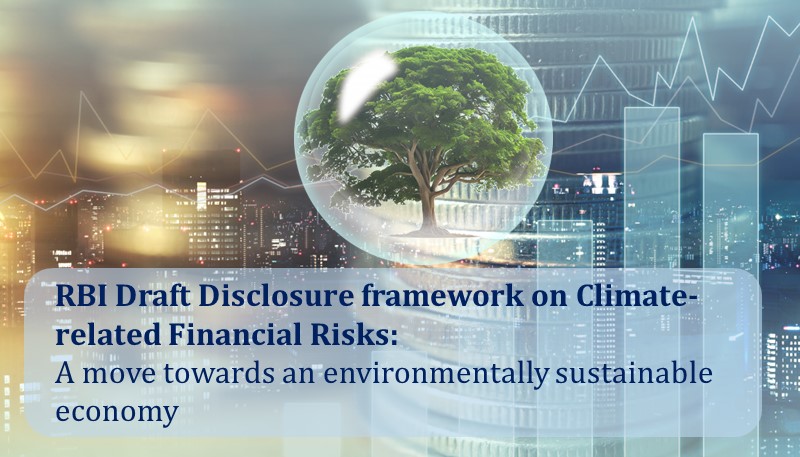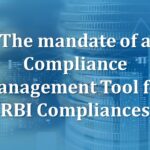With climate change significantly impacting all sectors of the economy, the Reserve Bank of India (“RBI”) in a recent press release has laid down the foundations for a standard disclosure framework for Regulated Entities (RE)[1] on climate-related financial risks[2].
What was the rationale behind RBI’s Disclosure framework on Climate-related Financial Risks?
It is anticipated that disclosures made by REs regarding climate-related financial risks will cultivate an early assessment of climate-related financial risks and facilitate market discipline. This will also eventually prevent mispricing of assets and misallocation of capital arising out of inadequate information.
To whom will the proposed disclosure framework apply?
The guidelines shall apply to all Top and Upper Layer Non-Banking Financial Companies (NBFCs), all Scheduled Commercial Banks (excluding Local Area Banks, Payments Banks and RRBs), all Tier-IV Primary (Urban) Co-operative Banks (UCBs) and all All-India Financial Institutions (viz. EXIM Bank, NABARD, NaBFID, NHB and SIDBI). It is pertinent to note that the adoption of these guidelines is voluntary in case of REs other than those mentioned above.
What are the four thematic pillars of disclosure?
The disclosures made by REs shall cover the following four thematic areas:
- Governance– REs shall be required to disclose governance controls undertaken by them covering the following key areas:
- Board’s oversight of climate-related risks and opportunities.
- Senior management’s role in the assessment and management of climate-related risks and opportunities.
- Strategy– The strategy undertaken by REs to manage climate-related financial risks and opportunities shall be a part of such disclosures and shall include:
- short, medium, and long term climate related risks and opportunities identified by REs.
- impact of climate-related risks on the RE’s businesses.
- resilience of RE’s strategy considering the various climate scenarios.
- Risk Management- The following disclosures should be made by REs:
- the processes and policies to identify, assess, prioritise, monitor and manage climate-related financial risks.
- the extent to which such processes are integrated into overall risk management.
- Metrics and Targets– The disclosure on metrics and targets must include progress towards climate-related targets or targets as set out by a statute or regulation. These disclosures shall broadly include:
Is there any commencement date prescribed for REs?
Providing ample time for implementation, the commencement year for different categories of REs has been suggested below:
|
Category of RE |
Governance, Strategy, and Risk Management |
Metrics and Targets |
|
SCBs, AIFIs, Top and Upper layer NBFCs |
FY 2025-26 onwards |
FY 2027-28 onwards |
|
Tier IV UCBs |
FY 2026-27 onwards |
FY 2028-29 onwards |
|
Disclosure requirements for the other REs shall be announced in due course |
||
Is there any requirement for validation/scrutiny of disclosures?
The disclosures shall be-
- subject to internal control assessments conducted by REs
- reviewed by the Board of Directors or a Committee of the Board
- included as a part of the financial results/statements of REs and
- published on REs’ website.
Gearing up for implementation of the disclosure framework-
Once the draft framework is notified by RBI, REs have to develop appropriate governance, strategy and risk management structure to manage climate change risk. They will also have to have a robust review mechanism and training programmes at all levels. The adoption of this framework will thus require a great initiative and effort on the part of the REs. In this journey towards sustainable financial system, REs can also take help of Komrisk, our Compliance Management tool having features like centralized compliance library, real time compliance status reports and customizable reminders.
[1] The following entities shall be collectively referred to as REs:
- All Scheduled Commercial Banks (excluding Local Area Banks, Payments Banks and Regional Rural Banks)
- All Tier-IV Primary (Urban) Co-operative Banks (UCBs)
- All All-India Financial Institutions (viz. EXIM Bank, NABARD, NaBFID, NHB and SIDBI)
- All Top and Upper Layer Non-Banking Financial Companies (NBFCs)
[2] Climate-related financial risks means the potential risks that may arise from climate change or from efforts to mitigate climate change, their related impacts and economic and financial consequences.
[3] Scope 1 greenhouse gas emissions are direct greenhouse gas emissions that occur from sources that are owned or controlled by the RE.
[4] Scope 2 greenhouse gas emissions are indirect greenhouse gas emissions from the generation of purchased or acquired electricity, steam, heating or cooling consumed by the RE. Purchased and acquired electricity is electricity that is purchased or otherwise brought into the RE’s boundary. These emissions physically occur at the facility where electricity is generated.
[5] Scope 3 greenhouse gas emissions are indirect greenhouse gas emissions (not included in Scope 2 greenhouse gas emissions) that occur in the value chain of an entity, including both upstream and downstream emissions.
[6] Greenhouse gases (GHGs) are those gaseous constituents of the atmosphere, both natural and anthropogenic, that absorb and emit radiation at specific wavelengths within the spectrum of thermal infrared radiation emitted by the earth’s surface, by the atmosphere itself, and by clouds. This property causes the greenhouse effect. Carbon dioxide (CO2), methane (CH4), and nitrous oxide (N2O) are the primary greenhouse gases in the earth’s atmosphere.
Written by: Nishtha Chakrabarti
Co-authored by: Amiya Mukherjee
Disclaimer
This content is intended for informational purposes only and does not constitute a legal opinion. Despite our efforts to maintain accuracy, we do not make representations, warranties or undertakings regarding the quality, completeness or reliability of the content. Readers are encouraged to seek legal counsel prior to acting upon any of the information provided herein. This content, including the design, text, graphics, their selection and arrangement, is Copyright 2024, Lexplosion Solutions Private Limited or its licensors. ALL RIGHTS RESERVED, and all moral rights are asserted and reserved.
For any clarifications, please reach out to us at 91-33-40618083 or inquiries@lexplosion.in. Refer to our privacy policy by clicking here.





